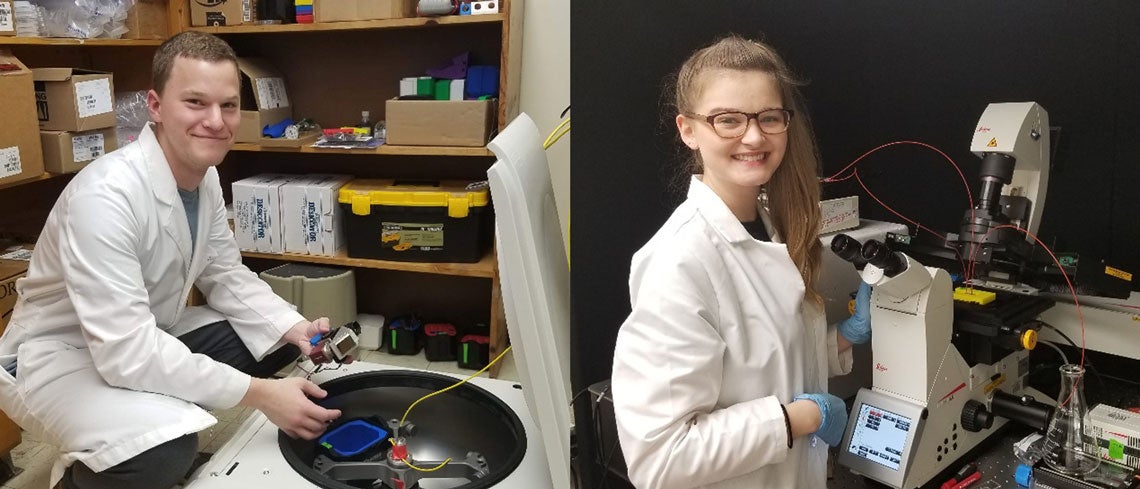Undergraduate Research
Research is an important part of science, and Physics majors have many opportunities to participate in it! ECU physics students are encouraged to participate in research throughout their undergraduate careers. Many undergraduate Physics majors work with faculty doing experimental research in laboratories and also doing theoretical and computational physics research. Students participating in research work on unsolved problems at the cutting edge of science, and have the opportunity to present their work at research symposia and scientific meetings. Many students even become authors on publications in scientific journals. Students also are required to complete the research-based capstone course, PHYS 4700 Advanced Physics Laboratory, where they learn about research techniques and scientific communication.

Physics undergraduates Justin Litofsky (left) and Miranda Lee (right) are shown working on research projects.
Research Opportunities in the Department of Physics
The Department has several ways to support and incentivize undergraduate research. There are independent-study research courses where students can get course credit for their research. The Undergraduate Research in Physics Award (URPA) provides funding to support assistantships and project expenses for undergraduate researchers. ECU’s Office of Undergraduate Research administers the Undergraduate Research and Creative Activity Awards (URCA) awards that provide support for undergraduate research. Often, ECU Physics majors are able to use departmental URPA support to develop a research project and then apply for continued support from the university-wide URCA program. In addition, many faculty members have research opportunities and sometimes additional funding for undergraduate researchers. Outstanding Physics majors may elect to complete an Honors project in Physics based on their research to graduate with the Physics Honors distinction.
Independent-Study Research Courses in Physics
Independent-study research classes provide academic credit for student research. Up to 3 s.h. of credit may apply to the BS-Physics degree. Some students take more than 3 s.h. of research courses, using the excess credit as a general elective applied toward the total number of credits needed to graduate. Below is an overview of the independent-study research courses offered in Physics. See the Physics course listing in the ECU Undergraduate Catalog for details. (Note that for research and laboratory courses 1 s.h. of credit is awarded for every two hours of work per week during the semester.)
- PHYS 2716 Introduction to Research in Physics – 1 s.h. of course credit for two hours of research per week. This course is available to incoming students without sufficient credits to enroll in 3000-level courses.
- PHYS 3716 Undergraduate Research in Physics – 1 s.h. of course credit for two hours of research per week.
- PHYS 3717 Undergraduate Research in Physics – 2 s.h. of course credit for four hours of research per week.
- PHYS 3718 Undergraduate Research in Physics – 3 s.h. of course credit for six hours of research per week.
- PHYS 4950 Physics Honors – 2 s.h. of course credit for students to complete and present an honors research project in Physics. See a description of Physics Honors below and also see the Physics Honors listing in the Undergraduate Catalog.
Students interested in taking one of these independent-study research courses must identify a faculty mentor and submit the Independent Study Application with learning outcomes, course requirements, a grading scale, and a study plan.
Undergraduate Research in Physics Award (URPA)
The URPA program provides support in the form of project expenses and research assistantships for undergraduate students to do research in physics.
Note that undergraduate assistantships are NOT normally awarded if student is earning course credit for work performed on a project. However, if it is anticipated that the student will work on the project for time and effort over and above what is required to receive the course credits, an undergraduate assistantship is appropriate.
URPA applications are due each year on Reading Day in December for funding during the next calendar year. Successful URPA recipients should apply to the University-wide URCA program for continuing support after the URPA project is complete.
Physics Honors Program
Outstanding physics majors have the opportunity to do intensive study in an area of special interest. Program participants begin by selecting a topic of mutual interest to both the student and project supervisor, then research the topic in the scientific literature, and finally conduct independent research on the topic. Upon completion the student must submit a detailed report as well as make an oral presentation about the project. See the ECU Undergraduate Catalog listing for Physics Honors.
How can I get started in undergraduate research in Physics?
It does not have to be difficult to get started doing research. Here are some things you can do.
- Review the Physics research and the faculty information pages listed on our web site. Contact any faculty member with an interesting program to ask about research opportunities.
- Talk to your Physics instructors about research opportunities in the department. They can provide insight (and many of them have opportunities available).
- Ask your Physics advisor about research opportunities.
- Don’t be afraid to volunteer to do some initial research or studying to get started in a faculty lab or research group. This is how many students lay the groundwork for taking research courses or applying for research funding.
- Network with other Physics majors, and ask them about research opportunities and experiences. The Society of Physics Students (SPS) is a good way to interact with other Physics majors.
- Contact the Assistant Chair for Undergraduate Studies (E-mail: physicsug@ecu.edu, phone: 252-328-6739) to find out more about undergraduate research at ECU.